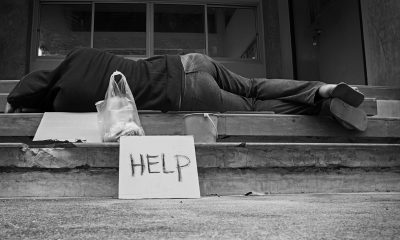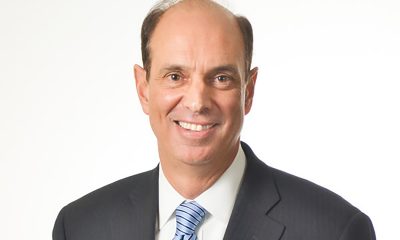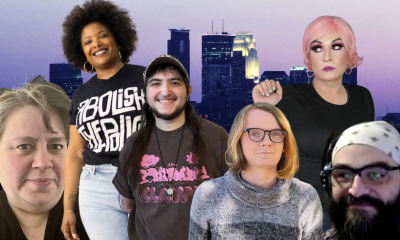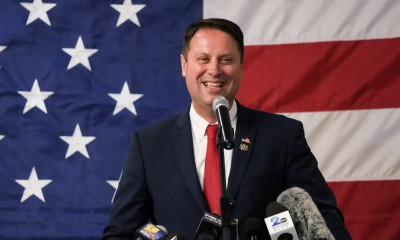Local
Longtime gay activist Frank Kameny dies
Community, public officials mourn loss of LGBT movement hero, pioneer
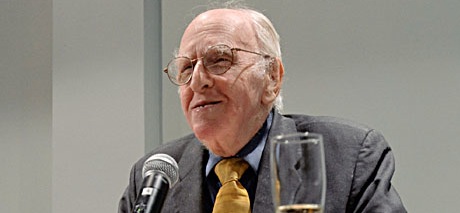
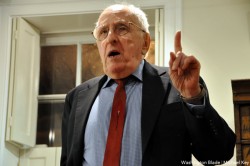
Frank Kameny’s gay rights activism predated the Stonewall riots by more than a decade. (Washington Blade file photo by Michael Key)
Expressions of condolences from LGBT activists and their straight supporters poured in from across the country this week following the death in Washington on Tuesday of Franklin E. Kameny, one of the nation’s most prominent gay rights leaders.
Friends said Kameny, 86, appears to have died in his sleep while in bed at his house in Northwest Washington. A representative of the D.C. Medical Examiner’s office, who spoke to friends and well-wishers who stood outside the house Tuesday night, said the cause of death couldn’t be immediately determined.
Kameny’s passing came a little more than a month before the planned celebration on Nov. 15 of the 50th anniversary of his founding of the Mattachine Society of Washington, the first gay rights organization in the nation’s capital.
LGBT rights advocates Charles Francis and Bob Witeck, who were longtime friends of Kameny’s and established the project to preserve Kameny’s papers over a 50-year period, said they would be announcing soon plans for a memorial service to honor the gay rights leader’s life.
Witeck said Nov. 15 is being considered as a possible date for a Kameny memorial gathering.
Timothy Clark, Kameny’s tenant and friend, said he found Kameny unconscious and unresponsive in his bed shortly after 5 p.m. on Tuesday. Clark said he became concerned when he arrived home a few minutes earlier and noticed Kameny hadn’t retrieved his newspapers, which are delivered outside the house in the morning.
He said he called 911 and rescue workers determined that Kameny had passed away earlier, most likely in his sleep. Clark said he had spoken with Kameny shortly before midnight on the previous day and Kameny didn’t appear to be ill or in distress.
Kameny is credited with being one of the leading strategists for the early gay rights movement – beginning nearly a decade before the 1969 Stonewall riots in New York’s Greenwich Village and continuing forward.
The Stonewall riots, triggered by a police raid of the Stonewall gay bar, are considered by most activist leaders as the starting point of the modern LGBT rights movement. But movement leaders credit Kameny and his collaborators in the Mattachine Society of Washington with laying the groundwork that enabled the post-Stonewall LGBT organizing to flourish.
“Frank was a revolutionary who lived to see the world change, and I’m comforted by that,” said Francis. “He was the first gay American to root the argument for gay civil equality in the words of Thomas Jefferson and the Declaration of Independence and Constitution.”
Gay historian David K. Johnson, who wrote about Kameny in two books on the gay rights movement, said Kameny broke from the early American “homophile” movement’s tactics of accommodation with the prevailing views that homosexuality was a disorder.
“Kameny’s style and tactics differed markedly from those of earlier homosexual leaders,” Johnson wrote in a 2002 article posted on the website of D.C.’s Rainbow History Project. “By unabashedly proclaiming that homosexuality was neither sick nor immoral, Kameny helped move gays and lesbians out of the shadows of 1950s apologetic, self-help groups and into the sunlight of the civil rights movement, setting the tone for a movement that continues today.”
It was during his years as head of the Mattachine Society of Washington that Kameny in July 1968 coined the phrase, “Gay is Good,” which activists say became a forerunner to the gay pride celebrations that followed the 1969 Stonewall riots.
Born and raised in New York City, Kameny served in combat as an Army soldier in World War II in Europe. After the war, Kameny received his doctorate degree in astronomy from Harvard University.
He came to Washington in 1956 to take a position teaching astronomy at Georgetown University. The following year, government recruiters persuaded him to take a job as a civilian astronomer with the U.S. Army Map Service in Washington.
NASA career derailed
Kameny told the Blade in a 2002 interview that the nation’s race against the Soviet Union for superiority in space had just begun in full force and he set his sights, among other things, on a possible role in the U.S. space program.
A short time later, Congress created the National Aeronautics and Space Administration and Kameny said he would have seriously considered applying to become an astronaut. But that was not to come about.
Just five months into his job at the Army Map Service, U.S. government security investigators uncovered information leading them to believe Kameny was gay. They opened an investigation into his alleged “threat” to national security. Within a few weeks he was dismissed from his job, with his name placed on a list of people labeled as government security risks.
Kameny challenged the dismissal before the U.S. Civil Service Commission, which set personnel policies for federal employees. The commission upheld the firing, prompting Kameny to take the matter to court. After losing in the lower courts, he appealed his case to the U.S. Supreme Court, becoming the first known gay person to file a gay-related case before the high court.
The Supreme Court upheld a lower court ruling against Kameny and declined to hear the case. But Kameny’s decision to appeal the case through the court system motivated him to become a lifelong advocate on behalf of LGBT equality.
Gay historian Johnson wrote in his 2002 article that Kameny’s lawyer withdrew from the case after the U.S. Court of Appeals ruled against Kameny, forcing Kameny to write his own appeal to the Supreme Court.
Johnson called Kameny’s 60-page legal brief filed before the high court a groundbreaking challenge to the federal government’s policy barring homosexuals from working for the government in any capacity. Johnson said it served as Kameny’s and the gay movement’s strategy document for advancing legal rights for gays in the years going forward.
Kameny’s Supreme Court brief, or petition, also offered the world its first glimpse of what became his trademark use of blunt, sometimes inflammatory language combined with reasoned arguments to challenge anti-gay policies.
“The government’s regulations, policies, practices and procedures, as applied in the instant case to petitioner specifically, and as applied to homosexuals generally, are a stench in the nostrils of decent people, an offense against morality, an abandonment of reason, an affront to human dignity, an improper restraint upon proper freedom and liberty, a disgrace to any civilized society, and a violation of all that this nation stands for,” he wrote in his Supreme Court petition.
“These policies, practices, procedures, and regulations have gone too long unquestioned and too long unexamined by the courts,” he wrote.
Gov’t apologizes to Kameny
Although Kameny lost his own case, he spent the next decade working with attorneys and other gay and lesbian federal workers to chip away at the then U.S. Civil Service Commission’s ban on gay federal employees through new court challenges. By 1975, after losing several cases to gay employees who won reinstatement to their jobs over a period of years, the Civil Service Commission dropped its ban on gay employees.
The change, which came under the administration of President Gerald Ford, was based on court rulings saying the government could not discriminate against homosexual federal employees if no evidence exists to show a harmful “nexus” between someone’s sexual orientation and their ability to perform their job.
Kameny, who called the development a major victory for gay rights, turned next to ongoing efforts to end two other anti-gay policies of the government – the ban on gays from receiving government security clearances and the ban on gays in the military.
In 2009, the Obama administration through the U.S. Office of Personnel Management – the successor agency to the Civil Service Commission – issued Kameny a formal apology for his 1957 firing. The apology was extended by OPM Director John Berry, an openly gay man.
In an area of work for which Kameny is less known, he established a paralegal practice in the 1970s that continued through the 1980s and early 90s to represent gays encountering problems obtaining or retaining security clearances as well as gays facing discharge from the military because of their sexual orientation.
Activists following his paralegal work, including those who he helped keep their security clearances, called Kameny a tenacious counsel who sometimes worked with lawyers and other times served as an administrative representative before adjudicatory hearings, including discharge hearings in all branches of the military.
“When the super-secret National Security Agency (NSA) was on the verge of firing me simply for discovering I was gay, I enlisted Frank Kameny’s help in resisting,” said Jamie Shoemaker, a linguist and NSA career employee.
“His gutsy, unapologetic efforts to save my career and that of many others with security clearances led to a ground-breaking change in the attitude of our country’s intelligence agencies toward gays,” Shoemaker said.
Kameny said he was pleased when his security clearance practice became mostly unnecessary in the 1990s when President Bill Clinton issued an executive order prohibiting discrimination based on sexual orientation in the issuance of government security clearances.
Soliciting sodomy
In his work with military service members ensnared in what activists called witch hunts, where military investigators pressured vulnerable gays to identify other gays under false promises of lenient treatment, Kameny coined another phrase aimed at helping those under investigation – “Say nothing, sign nothing, get counsel.”
Charles Francis and others who knew Kameny said his paralegal work met an important need in the years before groups such as Lambda Legal Defense and Education Fund and Servicemembers Legal Defense Network emerged to take on this type of legal work.
LGBT movement colleagues also credit Kameny with playing a lead role in the effort to persuade the American Psychiatric Association in 1973 to remove homosexuality from its list of disorders. As a scientist by profession, Kameny wrote and spoke often beginning in the 1960s about what he called the faulty or “junk” science that the psychiatric profession used to support its claim that homosexuality was a mental disorder.
Kameny and others supporting him within the profession argued that nearly all of the “gays are sick” theories were based on studies of patients in therapy. There were little or no studies made of the overwhelming majority of gays who never sought therapy and functioned well in society despite widespread anti-gay prejudice, Kameny and others argued.
When broader studies were conducted of gays and lesbians in the population at large, findings showed there were no differences in the numbers found to have mental health problems between samples of gays and straights, Kameny often pointed out.
In yet another area of work, Kameny is credited with playing an early and effective role in pushing for repeal of state sodomy laws, which made it illegal for consenting adults to engage in oral or anal sex in the privacy of the home. In keeping with his characteristic defiant rhetoric, Kameny sought to dramatize what he called the “lunacy” of laws prohibiting private, consenting sex.
On a number of occasions he publicly solicited public officials, including D.C.’s police chief in the 1960s, to engage in sodomy with him. In 1987, when the U.S. Supreme Court upheld Georgia’s sodomy law in the case Bowers vs. Hardwick, Kameny said he wrote letters soliciting sodomy to each of the Supreme Court justices that voted to uphold the law.
“I defied them to prosecute me,” he told the Blade. “They never did.”
Joe Solmonese, president of the Human Rights Campaign, said Kameny “led an extraordinary life marked by heroic activism that set a path for the modern LGBT civil rights movement.”
“From the early days fighting institutionalized discrimination in the federal workforce, Dr. Kameny taught us all that ‘Gay is Good,’” Solmonese said. “As we say goodbye to this trailblazer on National Coming Out Day, we remember the remarkable power we all have to change the world by living our lives like Frank – openly, honestly and authentically.”
Chuck Wolfe, CEO of the Gay & Lesbian Victory Fund, said Kameny’s death marked the “loss of a hero and a founding father of the fight to end discrimination against LGBT people.”
“Dr. Kameny stood up for this community when doing so was considered unthinkable and even shocking, and he continued to do so throughout his life,” Wolfe said. “He spoke with a clear voice and firm conviction about the humanity and dignity of people who were gay, long before it was safe for him to do so. All of us who today endeavor to complete the work he began a half century ago are indebted to Dr. Kameny and his remarkable bravery and commitment.”
Local activists who knew Kameny said they are deeply saddened over his passing but pleased to have shared time with him at several LGBT events in Washington during the past three weeks.
On Sept. 30, D.C.’s LGBT Community Center honored Kameny along with three other activists with its community service award at a ceremony at the downtown Hotel Sofitel. Kameny delivered what his activist friends called his standard and beloved fiery speech asserting his 50-year struggle to change society to bring about full and unabridged rights for LGBT people. It was to be his last speaking engagement.
His passing inside his house on Tuesday came several years after the city designated the house at 5020 Cathedral Ave., N.W., as a historic landmark because of the work Kameny and his activist colleagues performed there since the 1960s on behalf of LGBT rights. In 2010, the D.C. City Council voted unanimously to name a two-block section of 17th Street near Dupont Circle as Frank Kameny Way in honor of Kameny’s lifelong work on behalf of equality for the LGBT community and the community at large.”
Kameny’s death also came five years after Francis and Witeck helped arrange for the Library of Congress to acquire more than 50,000 documents from the Kameny Papers Project, which pulled together nearly 50 years of papers and documents that Kameny compiled through his work on behalf of LGBT people.
“Frank Kameny was the Rosa Parks and the Martin Luther King and the Thurgood Marshall of the gay rights movement,” Yale Law Professor William Eskridge told the Associated Press earlier this year.
District of Columbia
D.C. pays $500,000 to settle lawsuit brought by gay Corrections Dept. employee
Alleged years of verbal harassment, slurs, intimidation

The D.C. government on Feb. 5 agreed to pay $500,000 to a gay D.C. Department of Corrections officer as a settlement to a lawsuit the officer filed in 2021 alleging he was subjected to years of discrimination at his job because of his sexual orientation, according to a statement released by the American Civil Liberties Union of D.C.
The statement says the lawsuit, filed on behalf of Sgt. Deon Jones by the ACLU of D.C. and the law firm WilmerHale, alleged that the Department of Corrections, including supervisors and co-workers, “subjected Sgt. Jones to discrimination, retaliation, and a hostile work environment because of his identity as a gay man, in violation of the D.C. Human Rights Act.”
Daniel Gleick, a spokesperson for D.C. Mayor Muriel Bowser, said the mayor’s office would have no comment on the lawsuit settlement. The Washington Blade couldn’t immediately reach a spokesperson for the Office of the D.C. Attorney General, which represents the city against lawsuits.
Bowser and her high-level D.C. government appointees, including Japer Bowles, director of the Mayor’s Office of LGBTQ Affairs, have spoken out against LGBTQ-related discrimination.
“Jones, now a 28-year veteran of the Department and nearing retirement, faced years of verbal abuse and harassment from coworkers and incarcerated people alike, including anti-gay slurs, threats, and degrading treatment,” the ACLU’s statement says.
“The prolonged mistreatment took a severe toll on Jones’s mental health, and he experienced depression, Post-Traumatic Stress Disorder, and 15 anxiety attacks in 2021 alone,” it says.
“For years, I showed up to do my job with professionalism and pride, only to be targeted because of who I am,” Jones says in the ACLU statement. “This settlement affirms that my pain mattered – and that creating hostile workplaces has real consequences,” he said.
He added, “For anyone who is LGBTQ or living with a disability and facing workplace discrimination or retaliation, know this: you are not powerless. You have rights. And when you stand up, you can achieve justice.”
The settlement agreement, a link to which the ACLU provided in its statement announcing the settlement, states that plaintiff Jones agrees, among other things, that “neither the Parties’ agreement, nor the District’s offer to settle the case, shall in any way be construed as an admission by the District that it or any of its current or former employees, acted wrongfully with respect to Plaintiff or any other person, or that Plaintiff has any rights.”
Scott Michelman, the D.C. ACLU’s legal director said that type of disclaimer is typical for parties that agree to settle a lawsuit like this.
“But actions speak louder than words,” he told the Blade. “The fact that they are paying our client a half million dollars for the pervasive and really brutal harassment that he suffered on the basis of his identity for years is much more telling than their disclaimer itself,” he said.
The settlement agreement also says Jones would be required, as a condition for accepting the agreement, to resign permanently from his job at the Department of Corrections. Michelman said Jones has been on leave from work for a period of time, but he did not know how long. Jones couldn’t immediately be reached for comment.
“This is really something that makes sense on both sides,” Michelman said of the resignation requirements. “The environment had become so toxic the way he had been treated on multiple levels made it difficult to see how he could return to work there.”
Virginia
Spanberger signs bill that paves way for marriage amendment repeal referendum
Proposal passed in two successive General Assembly sessions

Virginians this year will vote on whether to repeal a state constitutional amendment that defines marriage as between a man and a woman.
Democratic Gov. Abigail Spanberger on Friday signed state Del. Laura Jane Cohen (D-Fairfax County)’s House Bill 612, which finalized the referendum’s language.
The ballot question that voters will consider on Election Day is below:
Question: Should the Constitution of Virginia be amended to: (i) remove the ban on same-sex marriage; (ii) affirm that two adults may marry regardless of sex, gender, or race; and (iii) require all legally valid marriages to be treated equally under the law?
Voters in 2006 approved the Marshall-Newman Amendment.
Same-sex couples have been able to legally marry in Virginia since 2014. Former Gov. Glenn Youngkin, who is a Republican, in 2024 signed a bill that codified marriage equality in state law.
Two successive legislatures must approve a proposed constitutional amendment before it can go to the ballot.
A resolution to repeal the Marshall-Newman Amendment passed in the General Assembly in 2025. Lawmakers once again approved it last month.
“20 years after Virginia added a ban on same-sex marriage to our Constitution, we finally have the chance to right that wrong,” wrote Equality Virginia Executive Director Narissa Rahaman on Friday in a message to her group’s supporters.
Virginians this year will also consider proposed constitutional amendments that would guarantee reproductive rights and restore voting rights to convicted felons who have completed their sentences.
District of Columbia
D.C. non-profits find creative ways to aid the unhoused amid funding cuts
City’s poor economic mobility makes it easier to slip into homelessness
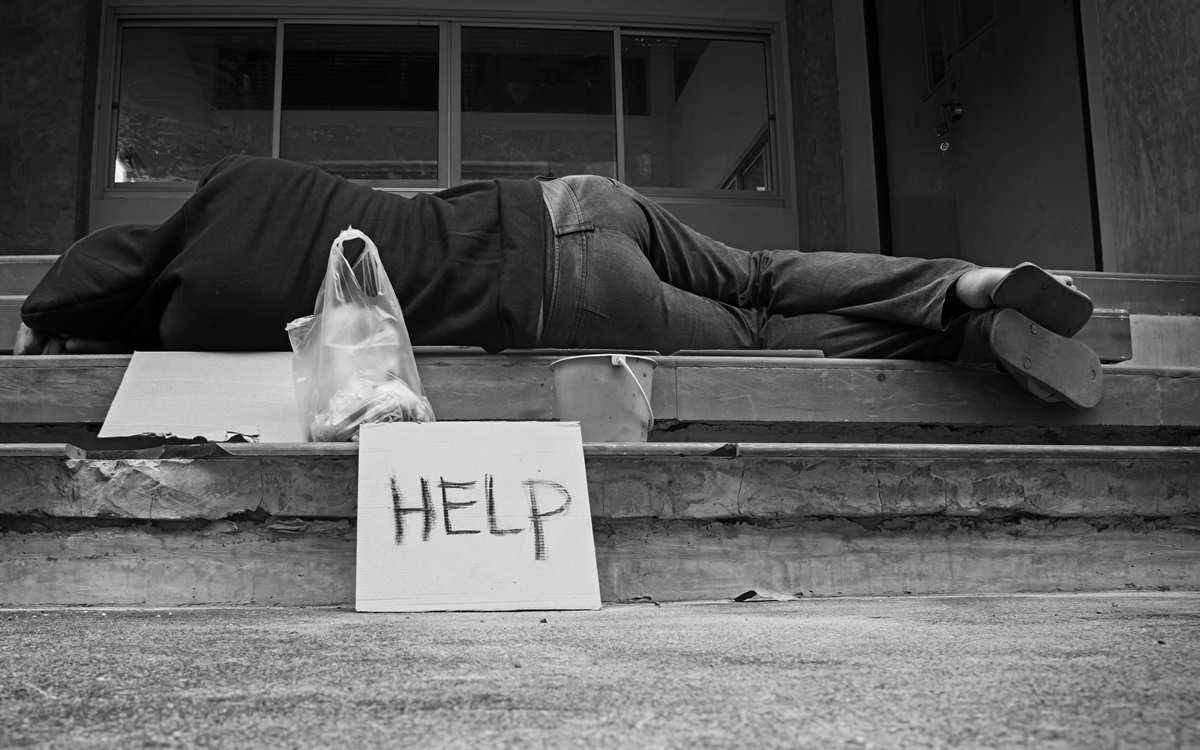
Homelessness is unlikely to disappear entirely, but it can be minimized and controlled.
That principle guides Everyone Home Executive Director Karen Cunningham’s approach to homeless support and prevention in D.C.
“There’s always going to be some amount of people who have a crisis,” Cunningham said. “The goal is that if they become homeless, [it’s] rare, brief and non-recurring. And in order for that to be the case, we need to have steady investments in programs that we know work over time.”
Making those investments has proven to be an unprecedented challenge, however. Cunningham said non-profits and other organizations like Everyone Home are grappling with government funding cuts or stalls that threaten the work they do to support D.C.’s homeless population.
Despite a 9% decrease in homelessness from 2024 to 2025, advocates worry that stagnant funding will make that progress hard to sustain. Furthermore, D.C. has the worst unemployment rate in the country at 6.7% as of December. The city’s poor economic mobility makes it easier for people to slip into homelessness and harder to break free of it.
There’s a way forward, Cunningham said, but it’s going to take a lot of perseverance and creative solutions from those willing to stay in the fight.
Fighting through setbacks
Reduced funding from the city government has shifted the way Everyone Home operates.
In D.C.’s fiscal year 2026 budget proposal, homeless services and prevention programs saw stalled growth or financial reductions. Even just a few years ago, Cunningham said Everyone Home received a large influx of vouchers to help people who needed long-term supportive housing. The vouchers allowed the non-profit to break people free of the homeless cycle and secure stable housing.
However, those vouchers are scarce these days. Cunningham said the city is investing less in multi-year programs and more in programs that offer preventative and upfront support.
She said this reality has forced Everyone Home to stop operating its Family Rapid Rehab program, which helps families leave shelters and transition into permanent housing. Current funds couldn’t withstand the size of the program and Cunningham said very few organizations can still afford to run similar programs.
The Family Homelessness Prevention program, however, is thriving and expanding at Everyone Home due to its short-term nature. It provides families with 90-day support services to help them get back on track and secure stable finances and housing.
Everyone Home also offers a drop-in day center, where they provide people with emergency clothing, laundry, and meals, and has a street outreach team to support those who are chronically homeless and offer services to them.
Inconsistencies in financial support have created challenges in providing the necessary resources to those struggling. It’s led non-profits like Everyone Home to get creative with their solutions to ensuring no one has recurring or long spouts of homelessness.
“It’s really a sustained investment in these programs and services that can allow us to chip away, because if you put all these resources in and then take your foot off the gas, there’s always people entering the system,” Cunningham said. “And so we have to always be moving people out into housing.”
Getting people in and out of the homeless system isn’t easy due to D.C.’s struggle with providing accessible and affordable housing, D.C. Policy Center executive director Yesim Sayin said in a Nov. 16 Washington Blade article.
Sayin said that D.C.’s construction tailors to middle or upper class people who live in the city because work brought them there, but it excludes families and D.C. natives who may be on the verge of homelessness and have less geographic mobility.
Building more and building smarter ensures D.C.’s low-income population aren’t left behind and at risk of becoming homeless, Sayin said.
That risk is a common one in D.C. given its low economic mobility. Residents have less room to financially grow given the city’s high cost of living, making vulnerable communities more prone to homelessness.
With funding cuts for long-term programs, preventative programs have proven to be vital in supporting the homeless population. When someone becomes homeless, it can have a snowball effect on their life. They aren’t just losing a house –– they may lose their job, access to reliable transportation and food for their family.
Cunningham said resources like the Family Homelessness Prevention program allows people to grow and stabilize before losing crucial life resources.
“Helping people keep what they have and to try to grow that as much as possible is really important where there aren’t a lot of opportunities…for people to increase their income,” Cunningham said.
Through all the funding cuts and reduced services, D.C.’s homeless support organizations are still finding a path forward –– a path that many residents and families rely on to survive.
Pushing forward
Local non-profits and organizations like Everyone Home are the backbone of homeless support when all other systems fail.
When the White House issued an executive order directing agencies to remove homeless encampments on federal land, Coalition For The Homeless provided ongoing shelter to those impacted.
“We were asked by our funders to open two shelters at the time of the encampment policy announcement,” Lucho Vásquez, executive director of Coalition For The Homeless, said. “We opened the shelters on the same day of the request and have been housing 100 more people who are unhoused each night since August.”
This was achieved even after Coalition faced “severe cuts in funding for supportive and security services,” according to Vásquez. Staff members have taken on additional responsibilities to make up for the loss in security coverage and supportive services with no increase in pay, but Vásquez said they’re still trying to fill gaps left by the cuts.
Coalition offers free transitional housing, single room occupancy units and affordable apartments to people who were unhoused.
Coalition For The Homeless isn’t the only non-profit that’s had to step up its services amid dwindling resources. Thrive D.C. provides hot meals, showers, and winter clothes, which is especially important during the winter months.
Pathways to Housing D.C. offers housing services for people regardless of their situation or condition. Its “Housing First” teams house people directly from the streets, and then evaluate their mental and physical health, employment, addiction status, and education challenges to try to integrate them back into the community.
Covenant House is a homeless shelter for youth ages 18-24. They provide resources and shelter for youth “while empowering young people in their journey to independence and stability,” its website reads. Through its variety of programs, Friendship Place ended or prevented homelessness, found employment and provided life-changing services for more than 5,400 people.
These groups have made a huge local difference with little resources, but Cunningham said there are more ways for people to support those experiencing homelessness if they’re strapped for time or money. Aside from donating and volunteering, she said even simply showing compassion toward people who are struggling can go a long way.
Cunningham said compassion is something that’s been lost in the mainstream, with politicians and news anchors regularly directing hostile rhetoric toward homeless populations. But now more than ever, she said caring and understanding for fellow community members is key to moving forward and lifting those in need up.
“People sometimes feel invisible or that there’s a sense of hostility,” Cunningham said. “I think all of us can at least do that piece of recognizing people’s humanity.”
(This article is part of a national initiative exploring how geography, policy, and local conditions influence access to opportunity. Find more stories at economicopportunitylab.com.)



